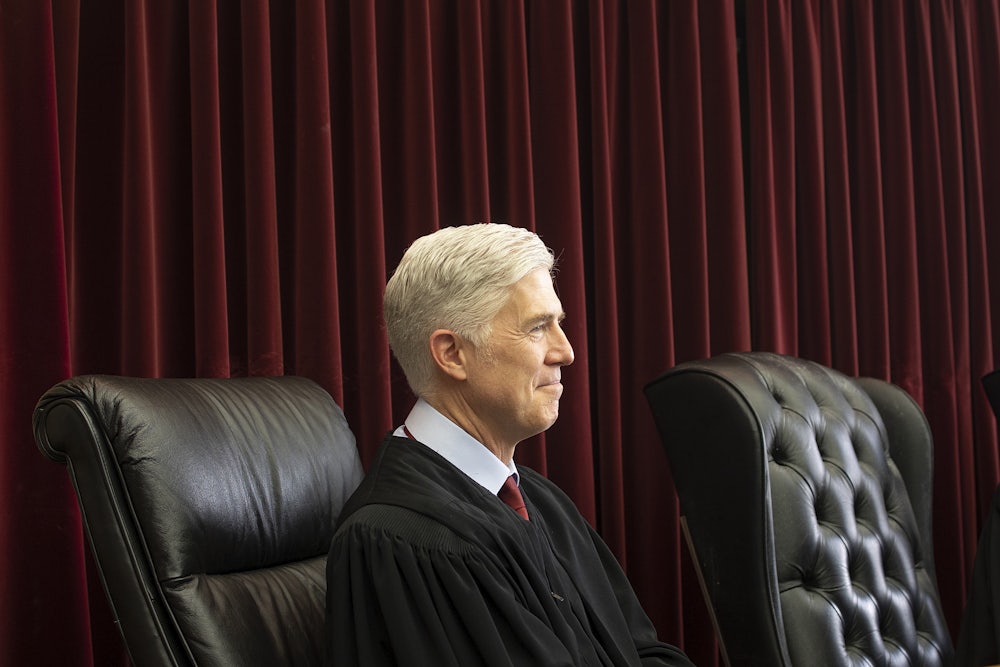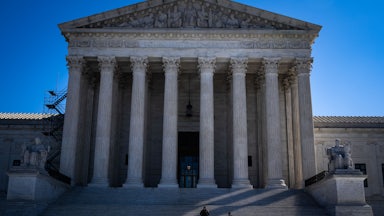In the halls of power of Washington, D.C., pork is usually associated with Congress. But on Thursday, it was pig husbandry day at the Supreme Court, where the justices declined to overturn an animal-welfare law in California that regulated how pork products are sold in the state. Pork producers sued because they claimed the law would unjustly force them to change how their operations work far beyond the Golden State.
That ultimately did not persuade Justice Neil Gorsuch, who mostly wrote for the majority in National Pork Producers Council v. Ross. “[Pork manufacturers] invite us to fashion two new and more aggressive constitutional restrictions on the ability of States to regulate goods sold within their borders,” he wrote. “We decline that invitation. While the Constitution addresses many weighty issues, the type of pork chops California merchants may sell is not on that list.”
The case is interesting if you care about how pork chops are made and sold throughout the country. It is also an intriguing new glimpse into how the court—and, particularly, its four newest justices—are thinking about interstate commerce claims and state laws. But it may be most insightful for showing how the different justices—chief among them, Gorsuch—think about the law and their role in applying it, at least in this circumstance.
The case finds its origins in 2018, when California voters approved a ballot measure known as Proposition 12 with more than 60 percent support. Prop 12 forbade the sale of pork and veal products within the state’s borders if the animals were raised and kept in “cruel” conditions. The measure defined “cruel” to mean conditions in which the livestock in question was prevented from “lying down, standing up, fully extending [their] limbs, or turning around freely,” among other things. That would effectively prohibit a form of confinement in which pigs are kept in enclosed metal boxes at all times unless they are giving birth, after which they are immediately returned to the crates, with this cycle continuing until the pigs are sent to the slaughterhouse.
Pork industry associations opposed the regulations, arguing that few U.S. farms raised pigs in conditions that would satisfy California’s new standards and would thus have to spend significant capital to bring their facilities into compliance. They also raised a legal argument against Proposition 12: Its enactment would violate the Constitution’s Dormant Commerce Clause by effectively forcing out-of-state pork producers to adopt an extraterritorial regulatory scheme with national implications.
The question is particularly salient in this case because “out-of-state pork producers” essentially means all U.S. pork producers. “Californians account for 13 percent of the nation’s pork consumption, but raise hardly any pigs,” the National Pork Producers Council told the Supreme Court in its review petition. “The massive costs of complying with Proposition 12 fall almost exclusively on out-of-state farmers. And because a single pig is processed into cuts that are sold nationwide in response to demand, those costs will be passed on to consumers everywhere, in countless transactions having nothing to do with California.”
Most Americans are familiar with the Constitution’s Commerce Clause, which allows Congress to write laws that govern “interstate commerce.” The Dormant Commerce Clause is an unwritten doctrine of federalism that prohibits the states from interfering with interstate commerce. One aspect of this doctrine generally prohibits the states from discriminating against out-of-state products in favor of in-state ones. The entire doctrine is more complicated than that, but life is short, time is money, and its various nuances are not relevant here.
In that specific sense, the doctrine helps maintain the integrity of interstate commerce throughout the various states of the Union. It generally ensures that one state does not impose additional regulations on a rival state’s goods or give preferential treatment to local industry over out-of-state rivals. (Again, there are exceptions, but this is not law school.) The pork industry argued that Proposition 12 violated an aspect of this doctrine by essentially regulating the entire industry outside California’s borders, forcing it to either comply with the new rules or not sell its products in the nation’s largest state.
“[Proposition 12] prevents the orderly operation of an unobstructed nationwide pork market—a market that is unquestionably essential to the Nation’s food security,” the industry told the court in its brief. “It upends the foundational principle of horizontal federalism that guarantees each state equal footing in the Union and its own sovereign dignity. And it threatens even greater harm, as other states enact competing and potentially retaliatory regulations, balkanizing the national pork market.”
California, for its part, disputed that it had effectively taken over the national pork market. “The only Proposition 12-compliant pork that out-of-state businesses must produce is the pork they choose to supply to California’s market; they are free to produce as many other pork products as they want, and to sell them to markets outside of California,” the state argued in its own brief for the justices. A federal district court and the Ninth Circuit Court of Appeals both agreed, with each ruling in favor of dismissing the lawsuit before it reached the Supreme Court.
The industry leaned heavily on Pike v. Bruce Church, a 1970 case where the Supreme Court ruled that state laws don’t violate the Dormant Commerce Clause “unless the burden imposed on such commerce is clearly excessive in relation to the putative local benefits.” In their view, reconfiguring the entire pork industry to meet California’s standards counted as a “clearly excessive” burden. But the court disagreed with that reading in what amounted to a 5–4 decision for various reasons—and, for more complicated reasons, was also a 6–3 ruling on Pike itself.
Gorsuch, writing for the 5–4 majority, rejected the idea that Proposition 12 fell within the Dormant Commerce Clause’s extraterritorial thinking. The measure was not protectionist in design to protect the state’s own (virtually nonexistent) pork industry, nor did it go so far as to commandeer out-of-state economic activity in the way that the court’s precedents usually cared about. He also wrote that the industry had misunderstood the Pike line of cases in the broader constellation of interstate commerce: The “clearly excessive” burden was meant to uncover whether the states were discriminating against out-of-state commerce in indirect ways.
Here is where the five justices in the effective majority—Gorsuch and Justices Clarence Thomas, Amy Coney Barrett, Sonia Sotomayor, and Elena Kagan—part ways. In a portion of the opinion signed only by Gorsuch, Thomas, and Barrett, the three justices try to limit Pike’s application in future cases by arguing that Congress, not the courts, is better equipped to weigh the costs and benefits of interstate commerce. “So far, Congress has declined the producers’ sustained entreaties for new legislation,” Gorsuch pointedly noted. “And with that history in mind, it is hard not to wonder whether [they] have ventured here only because winning a majority of a handful of judges may seem easier than marshaling a majority of elected representatives across the street.”
This is, to put it mildly, a fairly blunt comment for a Supreme Court justice to make about how litigants might see the court and its current lineup. It echoes how some liberals describe the court now that it has six conservative justices. And Gorsuch’s complaints about judicial balancing tests and statements of respect for democratic processes are all the more striking considering the fact that he was in the majority in West Virginia v. EPA last term. In that case, he and five of his conservative colleagues relied upon the major questions doctrine to strike down a long-defunct power plant regulation because it didn’t think Congress had “spoken clearly enough” on the matter. What counts as “speaking clearly”? We’ll find out in the future, I guess.
Six justices ultimately rejected the Gorsuch-Thomas-Barrett troika’s view of the Pike test. (Justice Brett Kavanaugh helpfully tallied up a scorecard in his own concurring opinion on the matter.) Sotomayor and Kagan, who otherwise joined Gorsuch’s opinion, broke with him on this point. “In short, I vote to affirm the judgment because [the pork producers] fail to allege a substantial burden on interstate commerce as required by Pike, not because of any fundamental reworking of that doctrine,” Sotomayor wrote in her own brief concurring opinion. In other words, in Sotomayor’s view, the pork industry couldn’t even get its foot in the courthouse door under Pike based on what it alleged would happen if Proposition 12 went into effect.
In his own dissent, Chief Justice John Roberts would let the pork industry step more than a foot inside the courthouse. He wrote that he would have remanded the case back to the court to reapply Pike more thoroughly, disagreeing with Sotomayor and Kagan on the outcome but siding with them on Pike’s continued validity. Kavanaugh and Justices Samuel Alito and Ketanji Brown Jackson joined his dissent. This is not to say that those four justices would have ultimately sided with the pork industry on its Pike claim. They simply would not have dismissed it out of hand, as five of their colleagues did for varying reasons.
When thinking about the court, most people typically describe it in the bluntest terms by noting there are six conservative justices and three liberal justices. That thinking isn’t quite wrong. For most cases that most people care about the most, this is the most relevant information when trying to predict what the outcome will be. But the court’s ideological balance can be more complicated when the justices are removed from the vicissitudes of the culture wars and from other ideologically tinged battles. If the list of cases left to be decided this term is any indication, however, that respite will be short-lived.










